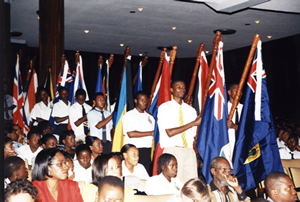Putting Commonwealth Values into Practice
Values have little impact if you fail to act on them. One of the interesting features of the Commonwealth is that the ways in which it acts, or the means through which it operates, must reflect the values it strives to uphold. For example, at both Singapore and Harare, Heads of Government affirmed their 
First, principles about equal rights and participation mean that every effort is taken to ensure that all participants at any Commonwealth forum have an equal opportunity to voice their perspectives, whether they represent large industrialised states or tiny, developing island economies. Since decisions are taken on the basis of consensus developed through dialogue, each member can contribute equally to the decisions taken, and no member can use a veto to control proceedings.
Second, the right to shape society through participation also means that the member states themselves fully determine the agenda of the Commonwealth through their inputs and contributions. Furthermore, members also contribute the funding to allow the Secretariat to take action in agreed areas.